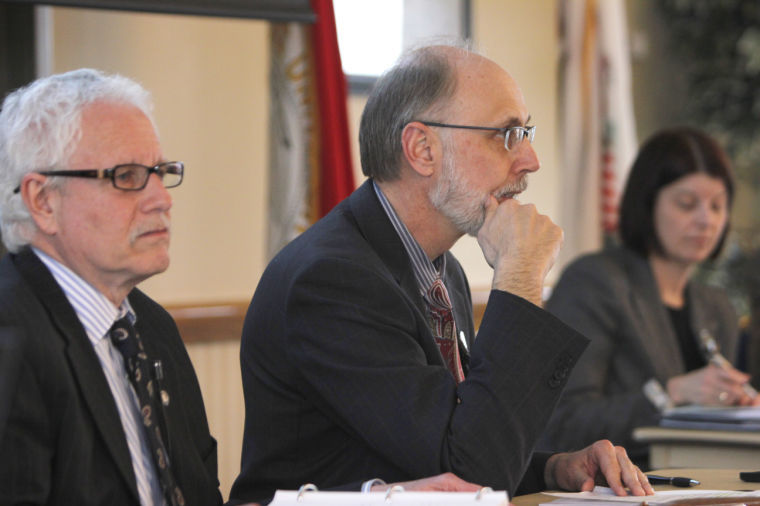800 employees expected to retire
NIU President Doug Baker discusses pension and the statement sent to the Illinois Supreme Court during University Council in May in the Holmes Student Center’s Sky Room.
May 4, 2014
NIU is preparing for an estimated loss of 800 or more employees, as the number of retirement applications to the State Universities Retirement System has reached an all-time high.
Pension reform — P.A. 98-599 — signed into law Dec. 5 will change the pension benefits of four of the five Illinois pension systems, including SURS, effective July 1.
The act will significantly affect employees under the SURS money purchase option, as they could lose up to a year’s worth of benefit accruals if they choose not to retire before the act’s effective date due to a wording glitch in the legislation. Not attributed to the glitch is the possibility of a $700 per month decline in retirement benefits should an employee retire after June 30.
SURS has filed more than 1,400 May and June retirement applications since the beginning of the calendar year, compared to a total of 657 May and June applications last year, said Beth Spencer, SURS communications manager. Spencer declined to say how many retirement applicants were NIU employees.
Despite the statewide retirement application numbers, Faculty Senate President Alan Rosenbaum, who announced a 20 percent faculty retirement rate at a March 26 Faculty Senate meeting, said the number he announced is unrealistically high.
“I think people wanted to dramatize the seriousness of the situation,” Rosenbaum said. “Realistically, although people might want to retire, they’re not eligible to retire, so we don’t even have 20 percent of our employees that are even eligible to retire.”
Five lawsuits challenge the constitutionality of the pension reform. Although each case differs on specifics, the Pension Clause of the Illinois Constitution is used throughout as a basis for the challenges.
The constitutionality of the act could take years to be decided, though the affected retirement systems will have two months to prepare for the first round of mandates, said James Lockard, president of State Universities Annuitants Association at NIU.
SUAA was the fifth organization to challenge the constitutionality of the act, filing a lawsuit March 3 in Champaign County.
“By setting an effective date, what the legislature did is dump a whole lot of extra work on SURS and the other retirement systems,” Lockard said. “And if it should be overturned so that it’s never implemented, all that time and money has gone down the drain.”
Associate law professor Marc Falkoff drafted a statement supporting a preliminary injunction that would stall the effective date of the pension reform act until its constitutionality can be determined, buying time for retirees who are on the fence about retiring and retirement systems.
“My real goal is just to find out whether any of the current plaintiffs out there are contemplating bringing a preliminary injunction so that our colleagues aren’t going to be put to a difficult decision,” Falkoff said.
Faculty Senate and University Council approved the draft statement April 23 and April 30, respectively.







